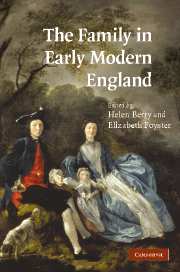Book contents
- Frontmatter
- Contents
- Preface
- Notes on contributors
- Anthony Fletcher
- 1 Introduction
- 2 Marriage, separation and the common law in England, 1540–1660
- 3 Republican reformation: Family, community and the state in Interregnum Middlesex, 1649–60
- 4 Keeping it in the family: Crime and the early modern household
- 5 Faces in the crowd: Gender and age in the early modern English crowd
- 6 ‘Without the cry of any neighbours’: A Cumbrian family and the poor law authorities, c.1690–1730
- 7 Childless men in early modern England
- 8 Aristocratic women and ideas of family in the early eighteenth century
- 9 Reassessing parenting in eighteenth-century England
- Select bibliography
- Index
7 - Childless men in early modern England
Published online by Cambridge University Press: 31 July 2009
- Frontmatter
- Contents
- Preface
- Notes on contributors
- Anthony Fletcher
- 1 Introduction
- 2 Marriage, separation and the common law in England, 1540–1660
- 3 Republican reformation: Family, community and the state in Interregnum Middlesex, 1649–60
- 4 Keeping it in the family: Crime and the early modern household
- 5 Faces in the crowd: Gender and age in the early modern English crowd
- 6 ‘Without the cry of any neighbours’: A Cumbrian family and the poor law authorities, c.1690–1730
- 7 Childless men in early modern England
- 8 Aristocratic women and ideas of family in the early eighteenth century
- 9 Reassessing parenting in eighteenth-century England
- Select bibliography
- Index
Summary
On the veryfirst page of that most famous of diaries, Samuel Pepys recorded an intimate detail of his married life from the winter of 1659: ‘My wife, after the absence of her terms for seven weeks, gave me hopes of her being with child.’ When he wrote this, he and Elizabeth had already been married for five years, but although they were both young, the hoped-for pregnancy had not materialised and the resumption of her cycle at the end of December that year proved yet another disappointment. One year later, having a child was still on their minds: Pepys recorded in his diary that they were referring to their bedroom as ‘the Nursery’. By 1662, however, he had begun to countenance ‘the possibility there is of my having no child’. Nonetheless, even in the context of his failing marriage, he did not give up his desire to be a father easily. In 1667 he wished a friend's child (‘a very pretty little boy’ whom he liked ‘very well’) was his own. He admitted to himself that he was troubled by the idea that he could be left without a brother or a son to continue his family name, a circumstance that did indeed materialise. As with so many other subjects, Pepys's diary provides a rare and detailed account of one man's hopes and fears, in this instance, his attitudes towards fatherhood and his personal sense of loss that he did not have children of his own.
- Type
- Chapter
- Information
- The Family in Early Modern England , pp. 158 - 183Publisher: Cambridge University PressPrint publication year: 2007
- 8
- Cited by

